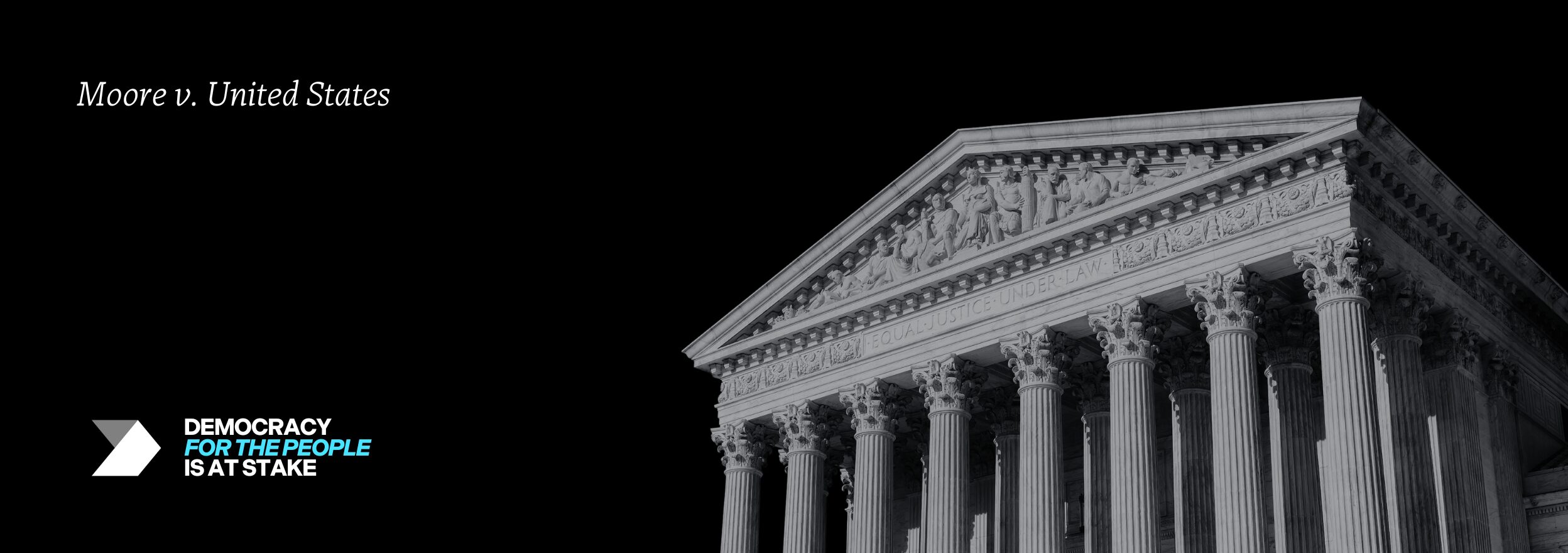
SCOTUS RULING
The U.S. Supreme Court issued a 7-2 ruling on June 20, 2024 in Moore v. United States, rejecting a challenge to Congress’ power to enact a one-time transition tax included in the 2017 Trump-era tax cuts that could have created years of tax uncertainty for small businesses and upended much of the country’s tax code.
Read more in Democracy Forward’s press release reacting to the ruling.
BACKGROUND
The plaintiffs in this case—backed by many far-right groups that enjoy close ties to Supreme Court justices—are challenging the constitutionality of the Mandatory Repatriation Tax (MRT), a one-time transition tax included in the 2017 Trump-era tax cuts designed to prevent accumulated earnings from going untaxed permanently.
The plaintiffs use the 16th Amendment to the U.S. Constitution (which authorizes Congress to tax income) to argue that the definition of “income” doesn’t include unrealized gains. They further argue that the MRT is a tax on unrealized gains because it taxes income that has been realized by a corporate entity, but has not been distributed to its shareholders. This is an aggressive position that would defy legal precedent and disrupt a long-settled and bipartisan supported structure for taxation and one that has been denounced by a broad range of ideologically diverse scholars and groups.
The potential harms of this case are why small businesses and a broad, ideologically diverse coalition have come out in support of the MRT’s constitutionality.
WHAT’S AT STAKE
While this case, on its face, concerns one provision in the 2017 tax package, it could have sweeping implications for our broader tax structure. Specifically, if the Supreme Court rules the way plaintiffs urge, it could create years of tax uncertainty for small businesses and upend much of the country’s tax code.
A ruling in favor of plaintiffs could call into question the tax provisions that govern millions of small businesses across the country. Such a result could undermine the stability of the federal tax structure that is critical to our economy and the success of small businesses — which make up 99.9% of businesses in the U.S. and employ nearly half of our nation’s workers. This unpredictability will not be evenly felt: an uncertain tax environment will make it harder for small businesses to compete against larger, more well-resourced corporations.
An unfavorable ruling could also cause chaos for states, including impacting state budgets given that their budgets often depend on federal revenue that would now be called into question.
WHO IS INVOLVED:
People Defending Progress:
Politicians and advocates across the ideological spectrum representing large swaths of the American public strongly support the constitutionality of the MRT. From former House Speaker Paul Ryan and the American Enterprise Institute to small business groups, 16 states, and the District of Columbia, many warn that an upending of the MRT will pose untold consequences across the economy.
Democracy Forward represented Main Street Alliance (MSA), Small Business Majority (SBM), and Anne Zimmerman (business owner, and co-chair of Small Business For America’s Future) in a brief making clear to the Supreme Court that made clear: “predictable tax burdens allow small businesses to confidently plan and prepare for the future.”
Extremists Attacking Democracy:
The unique coalition supporting the MRT contrasts starkly with the supporters of the Moores’ challenge, a constellation of highly-resourced, far-right, anti-democratic legal organizations with close ties to Federalist Society leader Leonard Leo and billionaires Harlan Crow and Paul Singer. Notably, the Moores are represented by David B. Rivkin, Jr., who interviewed Justice Alito for the Wall Street Journal article where Alito claimed Congress could not regulate Supreme Court ethics, and who is also representing Leonard Leo in defying Senate investigations into Leo’s close and potentially unethical ties to Supreme Court justices.
Far-right groups supporting the Moore’s challenge include:
- Leonard Leo-aligned groups (including Buckeye Institute, Southeastern Legal Foundation, and Competitive Enterprise Institute)
- The Manhattan Institute, funded by Harlan Crow and Paul Singer who have been reportedly connected to Justice Clarence Thomas and Justice Alito
- Corporate interest groups (U.S. Chamber of Commerce and the National Federation of Independent Businesses)
To see a full guide of the amicus briefs filed in this case, you can visit The Tax Law Center at the New York University School of Law’s compendium.